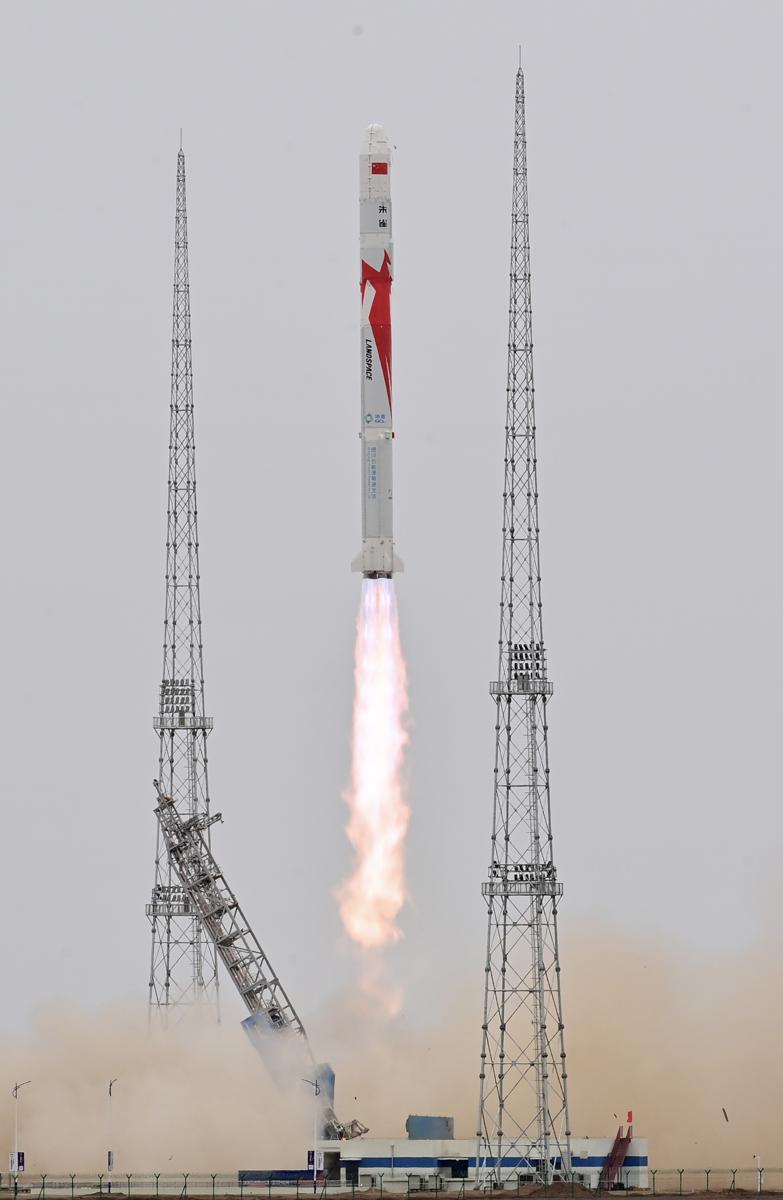China Sends World's First Methane Rocket into Orbit
China successfully flight-tested a methane-propelled carrier rocket on Wednesday morning at a launch facility in its northwestern Gobi Desert. [Photo by Wang Jiangbo/For China Daily]
China successfully flight-tested a methane-propelled carrier rocket on Wednesday morning at a launch facility in its northwestern Gobi Desert, marking the first orbital mission of any methane-fueled rocket in the world.
The rocket, named ZQ 2 or Rosefinch 2, blasted off at 9 am from the Jiuquan Satellite Launch Center in the Inner Mongolia autonomous region and transported an experimental payload into Earth's orbit, said LandSpace, a Beijing-headquartered private enterprise that designed and built the rocket.
The successful mission also made ZQ 2 the largest and most powerful private rocket in China.
According to LandSpace, the ZQ 2 is 49.5 meters tall and has a diameter of 3.35 meters — the same diameter as most of China's Long March-series rockets. It has a liftoff weight of 219 metric tons and a launch thrust of 268 tons.
The vehicle is capable of placing a 4-ton satellite into a typical sun-synchronous orbit about 500 kilometers above the Earth, or a 6-ton satellite into a low-Earth orbit with an altitude of 200 km.
The rocket's main propulsion system — the TQ 12 — is the first methane engine in China. Before LandSpace, only a handful of companies in the United States had developed such engines.
Compared with traditional types of rocket engines that can function only once, a methane engine is reusable and more environmentally friendly.
The maiden flight of the ZQ 2 model happened in December at the Jiuquan center. The rocket successfully crossed the Karman Line, the globally recognized boundary between Earth's atmosphere and the edge of space, but malfunctioned in its second stage and failed to reach orbit. That was the world's first attempt to achieve orbit with a methane-fueled rocket.
The Chinese model had been in a close race with Relativity Space's Terran 1 and SpaceX's Starship to be the first methane-fueled rocket in orbit.
LandSpace is making the ZQ 2 and its engines at its plant in Huzhou, Zhejiang province, the first privately owned carrier rocket factory in China and the largest of its kind in Asia.
Zhang Changwu, founder and CEO of LandSpace, said after Wednesday's launch mission that the ZQ 2's success means China now owns key technologies needed to build methane-propelled rockets.
Zhang said his company plans to launch the third ZQ 2 rocket in the near future to complete the type's technical verification phase, after which the model can enter commercial operation.
"Starting next year, we will launch the ZQ 2's initial commercial operation. We plan to perform three to four launches in 2024, and hope to launch another eight of these rockets in 2025," he said, adding that LandSpace engineers will continue to improve the model's carrying capacity.
According to Zhang, the company has also started designing a reusable rocket and the experience gained during ZQ 2's research and development will help advance the reusable type's design work.
Yang Yuguang, a senior space industry observer and vice-chair of the International Astronautical Federation's Space Transportation Committee, said the ZQ 2 has set a new milestone in the global space industry.
"This is the first time a rocket fueled by methane and liquid oxygen has entered Earth's orbit. Methane-liquid oxygen engines are widely recognized as the most suitable propulsion system for reusable rockets," he said.
Rocket engineers around the world have been striving to develop reusable engines for many years and those built previously needed a lot of money and time to undergo maintenance before they could be reused, according to Yang.
"By contrast, methane-liquid oxygen engines promise the most convenient checks and maintenance for reuse, saving a considerable amount of time and money," he said.
Yang's remarks were echoed by Jiao Weixin, a retired professor of Peking University's School of Earth and Space Sciences and a renowned blogger on space technology.
"Methane-propelled engines boast many advantages such as lower cost of fuel consumption, easier maintenance and more eco-friendliness," he said.
